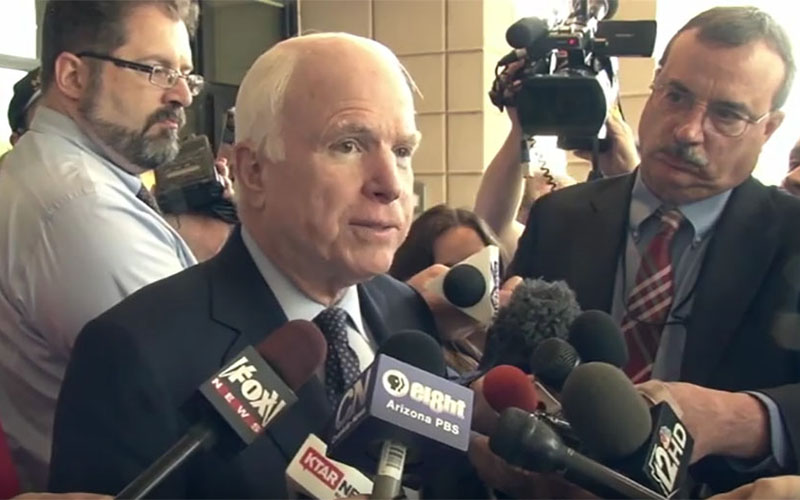
When he announced his re-election bid last April, Sen. John McCain, R-Ariz., said he always braces for a tough election fight. Now the five-term senator is skipping his party’s national convention to stay home and campaign in July. (Photo by Angie Schuster/Cronkite New
WASHINGTON – Sen. John McCain, R-Arizona, will not attend the Republican National Convention in Cleveland this July but will be “working and campaigning throughout Arizona,” a campaign official confirmed Tuesday.
“He (McCain) has always taken every election seriously, this year is no different,” McCain campaign spokeswoman Lorna Romero said.
The announcement comes as a new poll shows McCain and likely Democratic challenger, Rep. Ann Kirkpatrick, D-Flagstaff, tied at 42 percent of voters surveyed, a fact seized on by Kirkpatrick’s campaign.
“Ann Kirkpatrick has John McCain in the toughest re-election fight of his career,” said D.B. Mitchell, a spokesman for the Democrat’s campaign. He said McCain “hiding from the convention for the first time in three decades” won’t change the fact that he is losing support in the polls.
But one consultant suggested that McCain’s decision has less to do with a Kirkpatrick challenge and more to do with the senator trying to distance himself from current GOP presidential frontrunner Donald Trump and the expected party “bloodbath” in Cleveland.
Bill Scheel of Phoenix consulting firm Javelina said senators in purple states “are scared to death by getting dragged down by Donald Trump or (Texas Sen.) Ted Cruz and want to create as much distance as possible.”
But it’s not Kirkpatrick that McCain will be facing in August, when he will face Republican challengers Kelli Ward and Alex Meluskey in the GOP primary.
“It means McCain is starting to feel the heat in his home state,” said Joel Andres Frewa, a spokesman for the Meluskey campaign.
He said that while McCain is back in Arizona campaigning, Meluskey will be at the convention as a delegate “representing the voice of the people.”
Ward said McCain’s decision “speaks volumes.”
“Our primary is in August and the convention is in July,” Ward said. “It shows he’s pretty worried and should be in Arizona.”
But one Republican political consultant said McCain’s decision looks beyond the primary to the general election. Jason Rose said McCain’s decision to stay away from the “calamitous” convention was “displaying his savvy.”
“It’s a smart play in the short term, and it’s a smart play in the long term,” he said.
But others insist the decision to skip the convention shows signs of weakness from the McCain campaign.
A Rocky Mountain Poll released Friday showed McCain and Kirkpatrick getting 42 percent each in a telephone survey of 564 registered voters.
The poll showed Kirkpatrick solidifying support among Democrats and leading in rural areas – which traditionally lean Republican – by a margin of 43 to 39 percent. The poll had a margin of error of plus or minus 4.2 percent.
“He’s obviously running scared because he’s in real trouble,” said Rodd McLeod, a Democratic political consultant.
McLeod said he thinks the Republican brand is becoming more and more “unappetizing” as the election cycle goes on, which means the eventual GOP nominee will not be popular in Arizona – giving McCain reason to stay far away from the “ugly fight” that is brewing.
Scheel agreed that McCain distancing himself from the national campaign is a strategic move.
“At this point of a re-election campaign, you need to appeal to people in the middle, assume party base is locked up,” and not highlight party differences, Scheel said. But “there’s nothing more partisan than a national convention,” he said.
Kyle Kondik, managing editor of Sabato’s Crystal Ball at the University of Virginia’s Center for Politics, said there’s another reason McCain may not be enthusiastic about going to Cleveland.
While McCain has pledged to support the party’s nominee, Kondik said he is unlikely to do so with gusto. McCain has feuded with Trump, who belittled the senator’s war record, and referred to Cruz on the floor of the Senate as a “wacko bird,” Kondik noted.
“No wonder why McCain wouldn’t want to go to the convention,” he said.